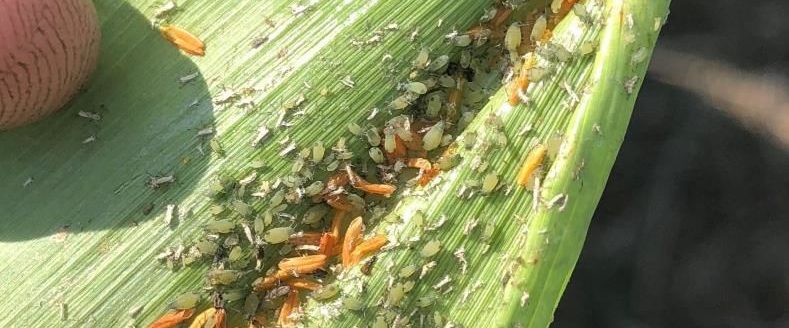Alta Seeds opens up a new frontier for sorghum growers with igrowth technology
For decades sorghum growers have asked private and public researchers to provide more effective ways to control weeds in their sorghum crops. Over-the-top weed control, for many farmers, would be the one thing that would open up new opportunities for growing sorghum on their farms.
For the 2021 growing season, Alta Seeds is opening up that new frontier of sorghum production with the commercial introduction of its igrowth® weed control technology for grain sorghum. The igrowth® weed control technology by Alta Seeds is Advanta’s proprietary non-GMO imidazoline tolerance technology in sorghum, which will allow farmers to spray a companion imidazolinone herbicide from UPL, currently under EPA review, for weed control without causing damage to the crop.
Charlie Haas is a sorghum farmer near Larned, Kansas, who also sells Alta Seeds sorghum. When he first saw demonstration plots of igrowth® he knew it was going to be a very exciting product for not only his farm, but also for the farms of his customers.
“Sorghum growers have been watching for something like this to come along since the first RoundupReady soybeans and corn,” Haas said. “There are farmers planting corn because there are options for weed control there that we just haven’t had in sorghum.” With igrowth® now commercially available to U.S growers for the 2021 season, that wait is finally over.
“I am very excited because there are very few options for in-crop rescue of sorghum from grassy weeds,” Haas said. “If you get grassy weed pressure after your sorghum comes up, there really have been no good options out there.” Haas said his customers who farm on sandier ground have horrible problems controlling grassy weeds. Even if they apply pre-plant herbicides to start clean, grassy weeds can come in during the season and rob the crop of vital nutrients and water.
“Pre-plant weed control wasn’t giving us everything we needed,” Haas said. “When grass moves into sorghum, you can lose up to 50% of your yield. The grass comes in and takes all of the moisture.” Losing half of a crop is a cost that farmers can’t afford in these times.
Haas said he sees another advantage to igrowth® sorghum is using it in continuous sorghum production systems.
“If we plant non-igrowth® sorghum the first year, and then follow it with igrowth®, we can control the volunteer sorghum,” Haas said. “In the second year, volunteer is a big problem. I see a lot of replant claims because volunteer sorghum comes up in the crop. There’s usually nothing a farmer can do but work that crop under or spray it and start over.
“But, with igrowth® sorghum, if we get that flood of volunteer sorghum from the year before, we can clear it up with an application of IMI product from UPL called ImiFlex, that’s currently under EPA review,” Haas explained. “That’s a big advantage for our continuous sorghum customers.”
With ongoing drought concerns in many parts of the Great Plains, farmers like Haas are converting their corn acres to sorghum acres to save their water resources.
“Historically, on my summer crop acres, I was one-third corn and two-thirds sorghum,” Haas said. “Now, I plant about 85% sorghum and a little bit of corn. I have a lot more sorghum this year because of drought.” Haas said he likes a sorghum-corn rotation because the sorghum crop does really well planted into corn stubble.
Haas added that this year sorghum was a better option for his farm because basis between sorghum and corn was much narrower. That along with the additional market opportunities abroad for sorghum, a crop that many countries purchase based on its non-GMO status, makes growing sorghum a lot better opportunity for Haas’s farm, he said.
“Sorghum provides more opportunities for our farm as far as diversifying the risk and making sure I get the most out of every acre,” Haas said.
One bonus to igrowth® is that it is a non-GMO technology that was developed in Advanta’s proprietary germplasm. That means no DNA from another species was introduced to the sorghum genome. The igrowth® traits were first discovered in 2007 by the Advanta Research and Development Team in Argentina. It has been available commercially in Argentina and Australia, and now in 2020 is commercially available for U.S. growers.
“Most of our farmers who grow sorghum know that we export a lot of it and they don’t want to risk that market,” Haas said. “That market is open to us because there’s no GMO sorghum. I’m glad that this isn’t a GMO because we would lose our export markets if it was, in my opinion. The igrowth® sorghum was found through natural breeding and because of that we don’t have a risk to the market we have for sorghum right now.”
Haas does caution that sorghum farmers should still practice good stewardship of the igrowth® technology and follow label directions.
“We should still rely on those pre-plant chemicals that are working to start clean,” Haas said. “Alta’s igrowth® is a great product to come in and lean on when we have problems, but don’t forget that we need to start clean too.” Good stewardship begins with following label directions and using the tools when they are needed and with an eye to preserving those tools for future seasons, he added.
“Still, just being able to rescue a sorghum crop from weed pressure is a huge, monumental thing we’ve never been able to do before this,” Haas said. And being able to do so without risking established non-GMO markets for the crop means a brighter new frontier is opening up for growers around the U.S.
Alta Seeds is a brand of Advanta, a global seed business that combines proprietary crop genetics and plant breeding capabilities with biotechnology to produce high-quality seed products and solutions for its customers around the world. Advanta is a member of the UPL group of companies.



